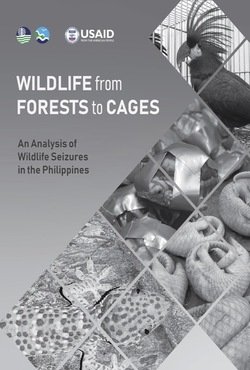By Emerson Y. Sy
The illegal wildlife trade is one of the most lucrative transnational crimes in the world. Numerous wildlife are threatened with extinction due to overexploitation for food, medicine, and as pets. Although it is difficult to quantify the illegal wildlife trade due to its mostly clandestine nature, analyzing seizure data can indicate its magnitude. Wildlife seizure records from the DENR, PCSDS, and other sources for the period 2010–2019 were collated and analyzed to identify species threatened by the illegal wildlife trade, hotspots, and trafficking routes. The 10-year seizure dataset involved 511 incidents, 283 taxa, and 44,647 wildlife individuals. Reptiles (n = 16,237 individuals) and birds (n = 6,042) were the top seized live wildlife, while pangolin scales (>2,100 kg) had the most quantity and seizure frequency among derivatives. Intervention policies on the key source, transit, and destination locations were proposed to address illegal wildlife trade in the country.
Manila: USAID Philippines, 2021. 56p.


